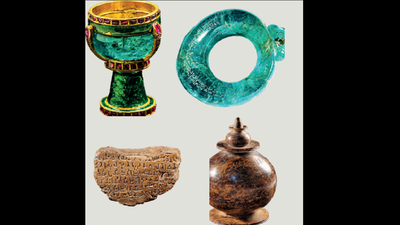Top Searches
- News
- City News
- kolkata News
- Kolkata: Shah Jahan’s emerald goblet, Buddha’s urn to be on display for 1st time at Indian Museum
Kolkata: Shah Jahan’s emerald goblet, Buddha’s urn to be on display for 1st time at Indian Museum
Synopsis
The museum, oldest and largest in Asia Pacific with one of the largest collections of antiques and rare items, has decided to showcase some of its most prized treasures on the occasion of International Museum Day on May 18.

The museum, oldest and largest in Asia Pacific with one of the largest collections of antiques and rare items,
KOLKATA: A 3rd century BC casket that once contained Lord Buddha’s relics, a stone-studded emerald-and-gold wine goblet belonging to Mughal emperor Shah Jahan and gold coins issued by his predecessors — Akbar and Jahangir — are among several priceless artefacts that will emerge from the formidable reserve collection of the Indian Museum for public viewing for the first time on Wednesday.
The museum, oldest and largest in Asia Pacific with one of the largest collections of antiques and rare items, has decided to showcase some of its most prized treasures on the occasion of International Museum Day on May 18. At present, the museum displays less than 6% of the 1.8 lakh items in its collection.
The show, titled ‘Power of Museum: Rare Treasures from the Collection of Indian Museum’, aims to ignite a passion in youngsters by tak-ing them on a fascinating time travel with the help of rare objects from archaeology, anthropology and art departments. “Each object has a story to tell, which is enthralling for not only the history buff but also the man on the street. The museum guides will tell these stories and the stories behind the stories, like how the object was found and how its history was rediscovered,” said Sayan Bhattacharya, the museum’s education officer .
The 17th century goblet belonging to Shah Jahan, who ascended the throne in 1628, is made of emerald and is studded with gold and ruby at the rim, handle and base. Also on display will be the emperor’s emerald bow ring with his name inscribed on it.
The museum, oldest and largest in Asia Pacific with one of the largest collections of antiques and rare items, has decided to showcase some of its most prized treasures on the occasion of International Museum Day on May 18. At present, the museum displays less than 6% of the 1.8 lakh items in its collection.
The show, titled ‘Power of Museum: Rare Treasures from the Collection of Indian Museum’, aims to ignite a passion in youngsters by tak-ing them on a fascinating time travel with the help of rare objects from archaeology, anthropology and art departments. “Each object has a story to tell, which is enthralling for not only the history buff but also the man on the street. The museum guides will tell these stories and the stories behind the stories, like how the object was found and how its history was rediscovered,” said Sayan Bhattacharya, the museum’s education officer .
The 17th century goblet belonging to Shah Jahan, who ascended the throne in 1628, is made of emerald and is studded with gold and ruby at the rim, handle and base. Also on display will be the emperor’s emerald bow ring with his name inscribed on it.
FOLLOW US ON SOCIAL MEDIA
FacebookTwitterInstagram
Looking for Something?

Start a Conversation
end of article

